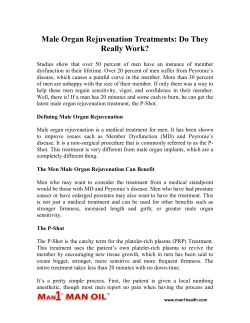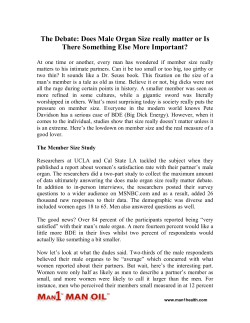
Regular Cycling Can Cause a Loss of Sensation in the Male Organ
Regular Cycling Can Cause a Loss of Sensation in the Male Organ Cycling is one of the best ways to get regular exercise, and that’s good for a man’s health. That said, cyclists are at risk when it comes to male organ health. Some researchers are pointing to evidence that cycling (and spinning is included here) is a potential cause of member dysfunction. So, are all those miles a man does every day taking a toll on his intimate life? Let’s find out. What Is Member Dysfunction? First, let’s define member dysfunction. Member dysfunction is actually very common; it’s estimated that 18 million men find themselves dealing with member function in some form or fashion. Member dysfunction is considered both a physical and psychological condition and is simply a man’s inability to either summon or maintain a hard-on 20 percent of the time. Many things contribute to member dysfunction, such as lack of sleep, stress, heart disease, diabetes, and obesity. It’s now time to add cycling to the list. How Does Cycling Contribute to Member Dysfunction? Hardcore cyclists (those who are cycling more than a few times each week) can spend hours each day sitting on a solid seat. The seat plus a man’s body weight puts pressure on the pudendal nerve, which wraps around the lower basin of a man’s body, encompassing his lower bowel, lower sensual organs, the back, and the perineum. This can lead to pudendal nerve entrapment, which can cause chronic pain in “the saddle” whether on a bike or not. Pudendal nerve entrapment can cause a loss of sensation in the male organ and other parts of the reproductive system. The continual pressure cycling puts on the entire area can lead to nerve compression and nerve damage, which results in a loss of sensation in the male organ. Loss of sensation in the male organ means hard-ons are hard to get and maintain, so ipso facto, member dysfunction comes into play. www.man1health.com Fight Member Dysfunction…With a New Bike Seat, Really? Getting a new bicycle seat is an excellent way for a man to protect his private area from nerve damage. The kind to buy? A split bicycle seat, which is made up of side-by-side cushions on a noseless saddle. Basically, it looks like a nicely molded bicycle seat with a hole in the upper middle. Some users call the hole an “anatomic relief hole,” which is kind of funny but also entirely accurate. The cut-out relieves the pressure that leads to nerve damage. However, a man should make sure that the seat lines up with his unique lower half and also is fit properly on the bike. This can take a fair amount of trial and error to find the perfect seat, and if unsure of how to properly fit the seat, have it professionally done by an experienced cyclist. Caring for the Male Organ If a man suspects that he has member dysfunction, he should schedule an appointment with his doctor for evaluation. If member dysfunction is indeed present, there are many ways to regain a loss of sensation in the male organ, which a physician can explain upon diagnosis. Thankfully, many men can reverse member dysfunction with a few small lifestyle changes. Another way to stave off nerve damage that can lead to a loss of sensation in the male organ is to use a specially formulated male organ health creme (health professionals recommend Man 1 Man Oil, which has been clinically proven safe and mild for skin) that contains L-carnitine. This unique amino acid can protect the nerve damage caused by compression and friction that leads to loss of sensation in the male organ. This crème also contains both L-arginine and vitamin C, which boost blood flow, helping a man achieve more strong hard-ons over time. www.man1health.com
© Copyright 2025












